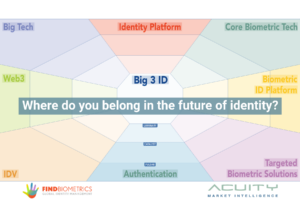Welcome to FindBiometrics’ digest of identity industry news. Here’s what you need to know about the world of digital identity and biometrics today:
Munich Airport Signs LOI to Explore Boarding Bridge Automation
Munich Airport has signed a Letter of Intent with Dabico Airport Solutions Germany to develop a concept for automated passenger boarding bridges. Once they’ve formulated a viable concept, they will develop a pilot for Munich Airport. The LOI was announced at this week’s Inter Airport Europe 2023 conference. Munich Airport was one of the first airports to support the launch of the Star Alliance Biometrics platform in 2020, and currently offers biometric access to gates and lounges as well as biometric boarding pass checks for travelers.
UN Agency OKs Noseprint Pet Registration
The International Telecommunication Union (ITU), a United Nations agency focused on IT standards, has granted consent to a noseprint-based registration method for pets, thanks in part to the efforts of Pireco. The student-led venture, which was spun out of South Korea’s Ulsan National Institute of Science and Technology, has developed a mobile app that scans the nose biometrics of an animal, offering an alternative registration method to microchipping. This method is now slated to become an ITU standard after a four-week consultation process with the international agency’s members.
Zimbabwe Telecom Deploys Fingerprint-Scanning KYC Tech
Econet, a major telecommunications provider in Zimbabwe, has now deployed fingerprint readers at all of its shops and distribution outlets. The move comes after reports near the start of the year suggesting that the telecom planned to implement a biometric Know Your Customer system. “Biometric authentication is a very secure form of authentication which will help enhance our customers’ protection and significantly reduce incidences of fraud and identity theft,” said Econet’s Chief Operating Officer, Kezitor Makuni.
Another Russian Bank Begins Collecting Customers’ Biometric Data
Tinkoff Bank has become the latest financial services provider in Russia to begin collecting customers’ biometric data and transferring it to government authorities. Tinkoff stared notifying customers in late September of its plans to collect their face data and send it the Unified Biometric System (UBS), which is managed by Rostelecom and overseen by the Communications Ministry and the Central Bank. In the spring of last year, the Russian government sent orders to VTB, Promsvyazbank, Rosselkhozbank, and Russian National Commercial Bank to begin sending customers’ biometric data to the UBS. Tinkoff customers are still able to withdraw consent for the sharing of their biometric data, but must do so via mail or in person.
Lipdub App Uses Deepfake Tech to Change Language Spoken in Videos
A new app called Lipdub can convert up to one minute of video-recorded speech into any of 28 languages. Created by New York-based startup Captions, the app uses face biometrics and deepfake technology to convincingly render the subject’s speaking in a given alternate language, while maintaining the same facial expressions as in the original uploaded video. CEO Gaurav Misra says the system is based on “zero-shot” AI models that don’t need to be trained on a particular speaker in order to generate successful output.
Zwipe Teams With Schneider Electric’s Security Unit
Zwipe has partnered with the Security Solutions arm of Schneider Electric, a France-based multinational specializing in digital automation and energy management. The Security Solutions Group offers access control, video surveillance, and other security solutions to its clients, and will now add to the mix Zwipe Access, the fingerprint-scanning smart card, which is compatible with Schneider Electric’s Continuum and Security Expert platforms. “Zwipe Access is the ideal fit to provide strong multifactor authentication through biometrics at a fraction of the cost of alternative technologies,” said Lee Guill, the Director of Schneider Electric’s Security Solutions Group.
FPC Gets Another Access Control Win
Fingerprint Cards’ biometric fingerprint sensor technology has been integrated into the Yale Assure Lock 2 Touch, Yale Home’s first smart lock device for the North American market. FPC’s President of Payment & Access, Michel Roig, says the fingerprint reader offers “quick authentication” with “no more need for physical keys” when using the device. It’s the latest sign of Fingerprint Cards’ deepening foray into access control, after the company’s recent announcement that its sensor technology had been incorporated into the latest version of Freevolt Technologies’ “S-Key” access card.
Jumio Looks to Scale Up With NextWealth
Jumio is looking to further scale up its operations thanks to a partnership with NextWealth, an India-based pure play data services provider. NextWeatlh is particularly focused on AI and Machine Learning services, which it offers through its own data centers. “Now more than ever, when our automation and quality rates have reached record levels, partnering with NextWealth enables us to focus on our core business and technology objectives and support our customers wherever they do business across the globe,” explained Jumio’s CEO, Stuart Wells.
iiDENTIFii Partners With Zambian Bank
South Africa-based iiDENTIFii has partnered with Zanaco, a major Zambian bank. The latter will leverage iiDENTIFii’s biometric technology for customer identification, with iiDENTIFii CEO Gur Geva suggesting that the tech will help Zanaco to “extend its reach to underserved populations, enabling them to open bank accounts, access credit, and make secure transactions.” In its home country, iiDENTIFii has been working with a trio of banks to implement biometric KYC systems as they work to have South Africa removed from a “grey list” compiled by the anti-money laundering organization Financial Action Task Force.
World Rugby Adopts Mouthguard Biometrics
World Rugby has teamed up with Prevent Biometrics. Don’t be misled by the name: Prevent Biometrics is not a privacy advocacy group. Rather, it is a Minnesota-based spinoff of Cleveland Clinic, and has developed a mouthguard outfitted with biometric sensors that can detect and measure head impacts. As Twin Cities Business reports, the wearable startup almost failed, spending millions over five years on a product that didn’t actually work. But under the leadership of a new CEO starting in 2020, the company successfully retooled its device, if not its brand name.
–
October 10, 2023 – by Alex Perala







Follow Us